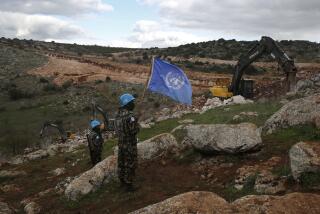Security Council Debates Sending Observers to Congo
- Share via
UNITED NATIONS — The Security Council on Thursday condemned reports of renewed violence in the Congo as diplomats debated authorizing a 5,500-member U.N. observer force to monitor a cease-fire agreement in the country.
Rebels reported last week that the Congolese government had waged offensives against them in eastern and northwestern Congo, despite the cease-fire agreement. The government has also complained about repeated rebel violations of the cease-fire.
“Members of the council expressed their deep concern over reports of recent massacres in the eastern part of the Democratic Republic of the Congo,” said Argentine Ambassador Arnoldo Listre, the current council president.
The United States, which devoted its presidency of the council last month to Africa, has taken the lead in drafting a resolution to beef up the international monitoring force.
An initial U.S. draft resolution, expected to be circulated shortly to council members, would expand the current U.N. mission in Congo from 79 military liaison officers to 5,537 military personnel, including at least 500 military observers. The mission would also include civilian support staff.
The mission would monitor the shaky, and often violated, cease-fire in Congo, Africa’s third-largest country. The accord was signed last summer in Lusaka, Zambia, by the Congo government and its supporters--Zimbabwe, Angola and Namibia. Rebels who rose up in August 1998 to oust Congolese President Laurent Kabila and their backers--Uganda and Rwanda--also signed.
The Lusaka agreement envisions an eventual U.N. peacekeeping force. But the U.S. draft only calls for monitors, and some council members are concerned about sending them while the cease-fire is being regularly violated.
The U.S. Congress must also approve any expansion of the current U.N. force there.
In Washington, Sen. Russ Feingold (D-Wis.) urged his colleagues to support the expanded force.
“Our interests in global peace and stability, the rule of law and respect for basic human rights are in part bound up in Congo’s future,” said Feingold, the ranking Democrat on the Senate Foreign Relations Subcommittee on Africa.
More to Read
Sign up for Essential California
The most important California stories and recommendations in your inbox every morning.
You may occasionally receive promotional content from the Los Angeles Times.













